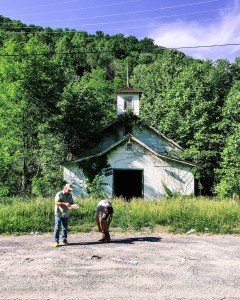Front Porch Blog
{ Editor’s Note } Donald Welch is a writer and educator currently living in Brooklyn, N.Y., who recently interviewed AmeriCorps members working with the federal Office of Surface Mining Reclamation and Enforcement in West Virginia. His work has appeared or is forthcoming in Day Hikes Near Denver, Grow Anywhere, and elsewhere. He writes about the intersection of environmentalism and technology at The Frontier Blog.

Photographer Brady Darragh and activist Chuck Nelson stand outside the abandoned union hall in Lindytown, W.Va. Lindytown’s population, like that of Coalville, was displaced by the mining industry. Photo by Brandon Lavoie.
In Mullens, W.Va., there’s a model town made from Popsicle sticks. While these sorts of projects are a fairly common hobby, this particular display is a replica of Coalville, a town that no longer exists.
The artist who made the model, once a resident of Coalville, constructed it from his memory and old photographs. The display sits in the Mullens Opportunity Center, home to the Rural Appalachian Improvement League, or RAIL, an organization focused on sustainability and creating social change in southern West Virginia. Like so many other towns in the Mountain State, the residents of Coalville left in search of new jobs when the area mine closed.
“Wyoming County and Mullens has a lot of people leaving,” says Nathan Tauger, a 23-year-old AmeriCorps alumni who served with RAIL, later adding that Wyoming County mainly has “older folks left so you get a lot of memories.” Tauger is a West Virginian himself, he hails the Morgantown area and elected to stay and volunteer in his home state. While memories were the motivating force behind the Coalville display, millennials like Tauger are volunteering throughout Appalachia and as they enter the region they bring an enthusiasm for technology and social media.
The millennial disposition — or “technology intuition” as Tauger describes it — helps small non-profits build a media presence in the community and beyond. Tauger says Twitter has helped RAIL “engage with outside stakeholders.”
“We were retweeted by a couple of government organizations, regional media outlets, bigger nonprofits, and universities over this past year,” says Tauger. “That helps us because visiting spring break groups see those tweets when they google us, grant makers see the tweets, potential volunteers and visitors see them. Earl Gohl, co-chair of the [Appalachian Regional Commission], follows us on Twitter.”
One of Tauger’s videos that is regularly tweeted from the RAIL account is of a community health initiative started by Patty Scott, a local pharmacist who donates her time at the Mullens Opportunity Center to run a free line dancing class. This class is an hour-long, once a week and encourages people to think positively about their bodies, have fun and bust a move.
“The Internet community in Wyoming County was probably not very big, but it felt very dense. Information can move quite quickly in Wyoming County,” Tauger recalls of the success of sharing local news and promoting events over social media. But he acknowledges the shortcomings of social networking as well. “It brought something of a false sense of belonging too. Hundreds of Facebook followers do not equal the kind of relationships built in person.” In a region where home broadband is only now becoming readily accessible, interpersonal relationships are still incredibly important for spreading information.
While RAIL’s outreach encourages plenty of groups to visit the Mullens area for volunteering, Tauger worked to engage youth in the community to create opportunities for Wyoming County residents. To that end, Tauger “interviewed leaders of successful mentoring programs, as well as lots of young folks who felt strongly about staying in or leaving Wyoming County.” Tauger went to work scheduling meetings with Volunteer West Virginia, Citizens Conservation Corps WV, WorkForce West Virginia, and Southern West Virginia Community and Technical College in order to coordinate youth initiatives.
RAIL is still building upon the groundwork Tauger laid during his AmeriCorps service and local volunteers continue to be integral to the organization’s community outreach and service projects. However, Tauger says, “Folks blame some of the region’s problems on character flaws, things like a lack of initiative among young people.” But the work of Tauger and other millennials all over Appalachia demands a change in the country’s perception of Appalachian youth.
“The character of young people reflects society’s investment in them,” says Tauger. “A sense of worth comes from how we’re treated and what we see in our communities, on the Internet and in media. To complain about the absence of personal responsibility in today’s youth is to conceal civic responsibility.”
Stay informed by subscribing to the Front Porch Blog.
PREVIOUS
NEXT
Related News

Leave a comment
Your email address will not be published. Required fields are marked *

Leave a Comment